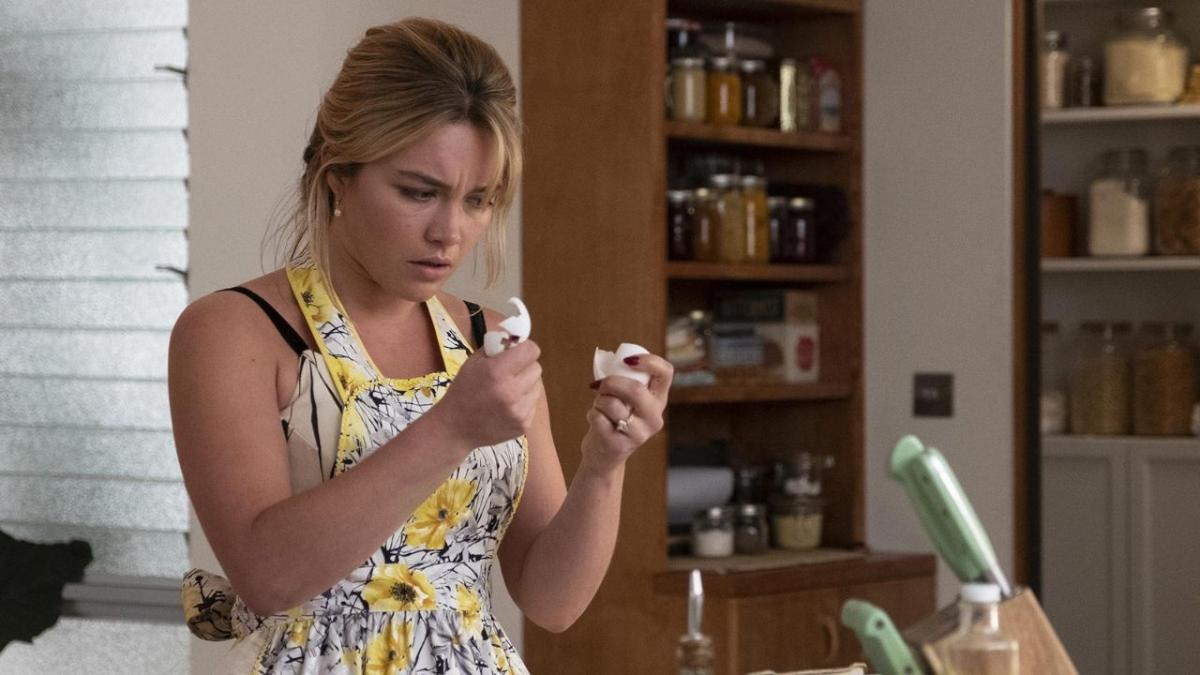
Don’t Worry Darling premiered in Sydney on Wednesday, 21 September and I wanted to like it, I really did.
I mean, I’d seen headlines of reviews that criticised Olivia Wilde‘s direction, so I knew it wasn’t going to be amazing. Others lauded Florence Pugh as the sole carrier of the film (ouch). Most critics were decidedly unimpressed with the much-hyped movie which “feels like a movie”. But either way, I was still keen because I’d watched Wilde’s directorial debut Booksmart and loved it.
So, despite the bad reviews, off I went to watch a movie I was expecting to be mostly okay. Spoiler alert: it wasn’t.
If you’ve seen promo for Don’t Worry Darling, you’ll know it appears to be set in some kind of neo-1950s American suburb in the middle of the desert, where everything is not as it seems.
The film appears to have Stepford Wives energy: Alice (Florence Pugh) lives an idyllic life with her sexy husband Jack (Harry Styles) until she realises something sinister is going on. Bits of her life give way to weird events that can’t be explained, and she starts to question her version of reality. At least, that’s what we know from the trailer.
But despite being a psychological thriller, Don’t Worry Darling does very little thrilling.
Me watching #DontWorryDarling knowing what every scene is because of the 100s of trailers and recognizing every outfit from paparazzi pics. pic.twitter.com/FYNEz1Is6X
— molly (@haylorsfavkid_) September 23, 2022
The pacing of the movie is a mess from start to finish, which sucks because if it wasn’t directed like it was, I think I could have really enjoyed it.
The film immediately launches us into Alice’s weird Black Swan-esque hallucinations, without actually building up her life as idyllic or perfect beforehand. Which means there’s no build up of tension — the exact opposite of what this genre requires.
Instead, we see her visions within minutes of the film’s start. If you hadn’t seen the trailer beforehand, you could probably assume this is her normal.
Don’t Worry Darling also never gives you any breathing room to process the bizarre parts of Alice’s life or the weird tensions surrounding her, either.
The shots, though beautiful and well-edited, are always in quick succession, in a way that is reminiscent of Wilde’s first film.
Except in that movie this type of directing made sense: it was a comedy about teenage girls on a wild night out, so you expect it to be choppy, chaotic, fun. Pulling that style into Don’t Worry Darling doesn’t work at all.
In a psychological thriller, you need time to digest the information being fed to you, to build the dread and tension necessary for its plot development. It’s what keeps you on the edge of your seat, guessing where this could go. But alas, the pacing fucking sucks.
Even though the pacing was super fast, the first hour and a half of this two hour movie are also incredibly boring. Which I do not say lightly. It got to the point where, after the excitement of gorgeous outfits and set designs wore off, I was seriously considering checking my phone — something I ordinarily consider a crime punishable by death in a cinema. That’s how fkn dire it was.
Why was it so boring, you ask? Because the first 90 minutes stays focused on letting us know things aren’t as they seem. Nothing actually happens. Except some extremely questionable depictions of Black women that I am definitely going to write about. Watch this space.
The real #DontWorryDarling question is where was KiKi Layne during the press tour? Her character’s presence is quite important throughout the entire movie. pic.twitter.com/Jvue2E6M2o
— Mike (@michaelcollado) September 20, 2022
Oh, and because I know you’re all dying to know: no, Harry Styles wasn’t *that* bad at acting. But he certainly wasn’t very good. He’s a rockstar, not a movie star.
The last 30 minutes of Don’t Worry Darling, however, I thought were pretty good. Or at least, much more enjoyable than the rest of the film.
During the third act, the genre shifts from psychological thriller to action blockbuster, which — though strange — I was honestly grateful for. I sat up straighter in my seat and had my eyes glued to the scene as things finally got interesting, and dare I say, kind of good.
Questions are answered, the veil is lifted, and the ending is — in my opinion — pretty fucking cool.
actual thoughts:
– florence pugh you will always be famous
– you are all doing harry so dirty with these clips
– wardrobe soundtrack aesthetic ATE
– the last half hour was a big slay
– some weird pacing throughout but i can forgive #DontWorryDarling https://t.co/gghxZFPN9x— aaron 🌙 (@aaronstruths) September 21, 2022
Olivia Wilde was definitely trying to say something when she made Don’t Worry Darling. Some of the final act’s feminist commentary was topical, interesting, and not too overdone in cinema.
I actually loved the concept of Don’t Worry Darling, of Alice’s character and backstory (Florence Pugh was amazing, by the way) and of what the film was *saying* about a certain growing issue in our society.
Too bad this concept, though strong, was so badly executed.
The film and pacing as messy as the drama surrounds it. What a pity.



